Related Research Articles

The Communist Party of India (Marxist) is a communist political party in India. It is one of the national parties of India. The party emerged from a split from the Communist Party of India in 1964. The CPI(M) was formed in Calcutta from 31 October to 7 November 1964.

The Communist Party of India is the oldest communist political party in India, and one of the eight national parties in the country. The CPI was formed on 26 December 1925 at Kanpur.

The All India Forward Bloc (AIFB) is a left-wing nationalist political party in India. It emerged as a faction within the Indian National Congress in 1939, led by Subhas Chandra Bose. The party re-established as an independent political party after the independence of India. It has its main stronghold in West Bengal. The party's current Secretary-General is Debabrata Biswas. Veteran Indian politicians Sarat Chandra Bose and Chitta Basu had been the stalwarts of the party in independent India.

The All India Trinamool Congress is an Indian national political party mostly active in West Bengal. The party is led by its founder and current chief minister of West Bengal Mamata Banerjee. Following the 2019 general election, it is currently the fourth-largest party in the Lok Sabha with 21 seats. Since its inception the party has been at the forefront of the anti-communist movement in West Bengal.

Jyoti Basu was an Indian politician who served as the Chief Minister of West Bengal state from 1977 to 2000. He was one of the co-founders of the Communist Party of India (Marxist) and a member of the Polit Bureau of the party since its inception in 1964 till 2008. He was noted to have been the longest serving chief minister in an elected democracy, at the time of his resignation.
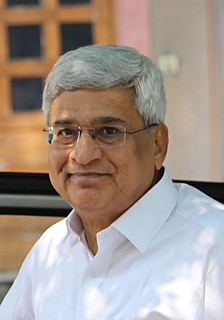
Prakash Karat is an Indian communist politician. He was the General Secretary of the Communist Party of India (Marxist) from 2005 to 2015.
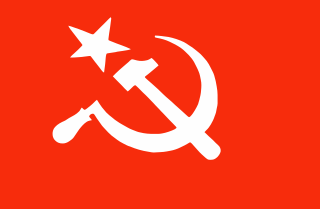
The Socialist Unity Centre of India (Communist)' or SUCI(C), previously called the Socialist Unity Centre of India and "Socialist Unity Centre" is a communist party in India. The party was founded by Shibdas Ghosh, Nihar Mukherjee and others in 1948.
Hannan Mollah is an Indian politician and a leader of the All Indian Kisan Sabha. He was elected to the Lok Sabha eight times representing the constituency of Uluberia in Howrah district of West Bengal. He is a Politburo Member of the Communist Party of India (Marxist).
Gurudas Dasgupta was an Indian politician and a leader of the Communist Party of India. In the 1950s and 60s, he held several offices as a student leader. Later he was a member of Rajya Sabha for three terms from 1985 to 2000 and of Lok Sabha for two terms from 2004 to 2014.
Prabodh Panda was an Indian politician. He is a leader of the Communist Party of India. He was elected to the 13th Lok Sabha from Midnapore constituency in West Bengal in a by-election held on 10 May 2001. He was re-elected to the Lok Sabha in 2004 and 2009 from the same constituency.

Violence occurred in Nandigram, East Midnapore, West Bengal, India, in 2007 in the aftermath of a failed project by the communist Government of West Bengal to acquire land for a special economic zone (SEZ). The policy led to an emergency in the region, and 14 people died in a police shooting. Mamata Banerjee and her All India Trinamool Congress party noted the issue, and the slogan Ma Mati Manush was used in their election campaigns. The Central Bureau of Investigation later exonerated the Buddhadeb Bhattacharya government of responsibility for the shootings.
Mohammed Amin was an Indian politician from the Communist Party of India (Marxist), the largest communist party in India. He was a Vice President of the Centre of Indian Trade Unions.
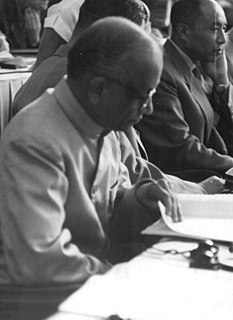
Shripad Amrit Dange was a founding member of the Communist Party of India (CPI) and a stalwart of Indian trade union movement. During the British Raj, Dange was arrested by the British authorities for communist and trade union activities and was jailed for an overall period of 13 years.
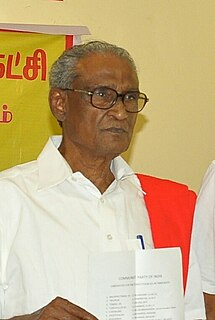
David Pandian was an Indian politician who served as Member of Parliament elected from Tamil Nadu. He was elected to the Lok Sabha as an Indian National Congress–United Communist Party of India (UCPI) candidate from North Chennai constituency in 1989 and 1991 elections. He was the Tamil Nadu State Secretary of the Communist Party of India for nearly six years till 2015 when he was succeeded by R. Mutharasan.
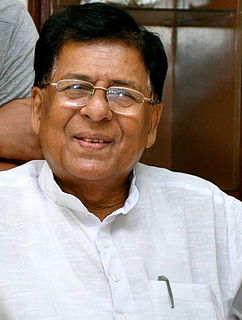
Baishnab Charan Parida, was a BJD politician, writer and social activist. He was a Member of Rajya Sabha and represented Odisha. Socialism and secularism are his main mantras. He was elected to Rajya Sabha in July 2010 and his term ended on 1 July 2016. He fought to bring the Odisha Official Language Act, 1954.

Surjya Kanta Mishra is an Indian politician, belonging to the Communist Party of India (Marxist). He served as Minister of Health and Minister in-charge of Land & Land Reforms, Panchayats & Rural Development in the Left Front governments of West Bengal and is the Secretary of the Communist Party of India (Marxist), West Bengal State Committee. After the 2011 assembly election he was elected as Leader of the Opposition in the West Bengal Legislative Assembly in May 2011. He was inducted into the politburo of the CPI(M) following the death of veteran leader M.K. Pandhe in 2011. In 2015, he was elected as the state secretary of CPI(M) in West Bengal, succeeding Biman Bose.

Geeta Mukherjee was an Indian politician and social worker and a four times MLA from Panskura Purba, from 1967 to 1977. As a Member of Parliament, she was elected seven times from the Panskura constituency, from 1980 to 2000, in the Indian state of West Bengal being a Communist Party of India (CPI) candidate. She also remained the president of National Federation of Indian Women, women's wing of Communist Party of India. She led the demand for the legislature of 1/3rd reservation for women in parliamentary elections in India.
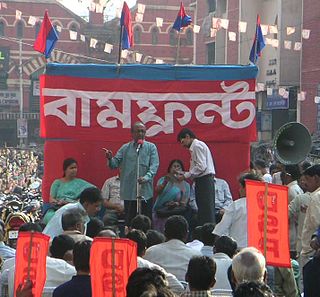
The Left Front is an alliance of political parties in the Indian state of West Bengal. It was formed in January 1977, the founding parties being the Communist Party of India (Marxist), All India Forward Bloc, the Revolutionary Socialist Party, the Marxist Forward Bloc, the Revolutionary Communist Party of India and the Biplabi Bangla Congress. Other parties joined in later years, most notably the Communist Party of India.

In 1964 a major split occurred in the Communist Party of India. The split was the culmination of decades of tensions and factional infighting. When India became independent in 1947, differences arose of how to adapt to the new situation. As relations between the Nehru government and the Soviet Union improved, a faction that sought cooperation with the dominant Indian National Congress emerged within CPI. This tendency was led by S.A. Dange, whose role in the party hierarchy became increasingly controversial. When the Sino-Indian War broke out in 1962 Dange's opponents within CPI were jailed, but when they were released they sought to challenge his leadership. In 1964 the party was finally divided into two, with the left faction forming the Communist Party of India (Marxist). The split had a lot of regional variations. It also impacted other organizations, such as trade union and peasant movements. The split has been studied extensively by scholars, who have sought to analyze the various domestic and international factors involved.
References
- ↑ "CPI leader Prabodh Panda passes away". The New Indian Express.
- ↑ "CPI leader Gurudas Dasgupta passes away" – via The Economic Times.
- ↑ "Leadership". CPI Official Copy.
- ↑ "CPI leader Prabodh Panda passes away". The New Indian Express.
- ↑ "Local body elections a litmus test for West Bengal CPI". The New Indian Express.
- ↑ "List of Campaigners" (PDF). ceoassam.nic.in. 2019. Retrieved 3 February 2021.
This article needs additional or more specific categories .(February 2021) |